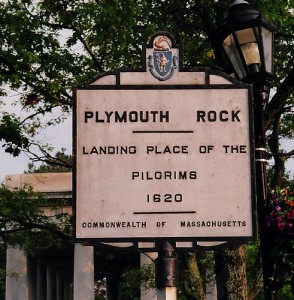Pilgrims, The Original Illegal Immigrants, Had it Good
 In some circles this is treading on blasphemy, and that’s more the reason to go there. The story of the hardship of the first colonists to arrive and settle in the “New World” (that was already here, so it wasn’t new) is well known in its heroic proportions. In fact half of the group that arrived on the Mayflower didn’t survive the first winter. Those who lived to see the first spring must have been made of hardy stuff. We should take nothing away from their trial.
In some circles this is treading on blasphemy, and that’s more the reason to go there. The story of the hardship of the first colonists to arrive and settle in the “New World” (that was already here, so it wasn’t new) is well known in its heroic proportions. In fact half of the group that arrived on the Mayflower didn’t survive the first winter. Those who lived to see the first spring must have been made of hardy stuff. We should take nothing away from their trial.
But as far as immigrants are concerned, these people had carte blanche. An article in The Atlantic puts it this way: “But in one important respect, at least, the Pilgrims and the other “first wave” of immigrants to these shores had it far easier than the immigrants who followed them. Because those early immigrants didn’t have to integrate into a formal, dominant, existing culture. (True, there were Native Americans here, but they didn’t require the Pilgrims to join their tribes.) So the Pilgrims got to create their own, brand-new culture out of broad cloth, keeping the aspects of their English heritage that they liked–including their language–while changing the parts of it they considered repressive, forming the rules and social hierarchy of their new society to suit their own tastes. Few immigrants in the years since have had that luxury.”
There was no Sheriff Arpaio, Tom Tancredo or Lamar Smith to tell them they needed to be more whatever. What those first immigrants didn’t contend with was having to blend into well rooted traditions and cultural ways. Immigrants after that first wave encountered a different reality. Again the Atlantic: “At the same time, however, few immigrants cut their ties to their native culture entirely. Hence the existence of ‘Jewish American,’ ‘African-American,’ ‘Japanese-American,’ or ‘Irish American’ museums in the first place. We hyphenate our cultures the way many women hyphenate their married names: to retain a solid reminder of our previous identity, even in the midst of our new life.”
An interesting thing that the article points out is that those Mayflower travelers first went to Holland, where they were guaranteed religious freedom. But they found it difficult to confirm to the established Dutch culture. So they moved on.
No one asked them for their papers or forced them to learn a new language when they got here. The rest is history.
[Photo by BostonPhotoSphere]
